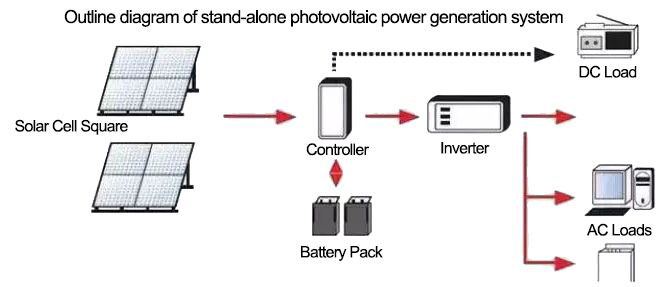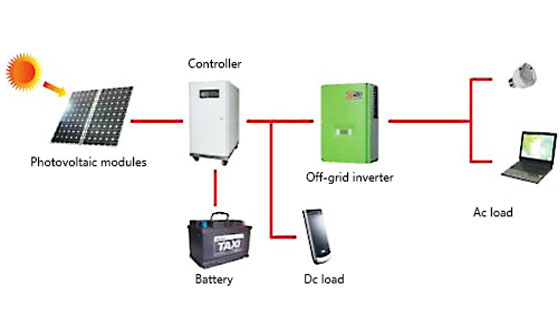With the rapid development of renewable energy technology, off-grid photovoltaic (PV) power stations have seen widespread application in remote areas, isolated islands, fishing boats, outdoor breeding bases, and other locations not covered by the grid or experiencing frequent power outages. However, there has been ongoing debate about whether off-grid PV power stations need to be equipped with batteries. Home Power Inverter here will delve into the differences between off-grid and grid-connected PV power stations, the composition of off-grid PV systems, the necessity of batteries in the system, and economic considerations.
Off-grid vs. grid-connected PV power plants: Key differences
The biggest difference between off-grid and grid-connected PV power stations lies in their connection to the grid and their operational principles. Grid-connected PV power stations use inverters to convert the direct current (DC) generated by solar panels into alternating current (AC) and directly feed it into the national grid, achieving grid-connected operation. In grid-connected PV power stations, excess electricity can be sold to the state, generating economic benefits. On the other hand, off-grid PV power stations do not need to be connected to the grid. They convert solar energy into electricity through solar panels, store it in batteries, and then use inverters to convert DC into AC for household or equipment use.
Components of off-grid PV systems
An off-grid PV system primarily consists of the following components: PV modules (solar panels), off-grid inverters (including PV chargers/inverters), storage batteries, PV mounting structures, cables, and distribution boxes. The PV modules are responsible for converting solar energy into electricity. The off-grid inverter converts DC into AC for household or equipment use. The storage battery stores the electricity, ensuring that the system can still provide power when the solar panels cannot generate electricity. Additionally, PV mounting structures support the PV modules, and the cables and distribution boxes handle the transmission and distribution of electricity.

Do off-grid power plants need batteries?
As an independent power generation system, the most significant feature of off-grid photovoltaic (PV) power stations is that they do not need to be connected to the grid. Therefore, they must rely on storage devices to store electricity. In an off-grid PV system, batteries are an indispensable component. The electricity generated by the solar panels is first stored in the batteries. When power is needed, the stored energy in the batteries is converted into alternating current (AC) by the inverter for household or equipment use. Without batteries as storage devices, an off-grid PV system cannot function properly.
Additionally, the choice of batteries is a crucial consideration in the design of an off-grid PV system. Different types of batteries have varying performance characteristics and suitable applications. For example, lead-acid batteries are low-cost but have a relatively short lifespan, while lithium-ion batteries have higher energy density and longer lifespans but are more expensive. Therefore, selecting batteries requires a balance between actual needs and budget.
Economic considerations and practical applications
While batteries play a critical role in off-grid PV systems, their costs are relatively high. Batteries typically account for 30-50% of the total system cost and generally have a lifespan of 3-5 years, necessitating periodic replacement. From an economic perspective, the construction and operation costs of off-grid PV systems are relatively high, making large-scale promotion challenging in areas with convenient grid access. However, in regions without grid coverage or with frequent power outages, off-grid PV systems are highly practical and economical. These areas often lack stable power supply, and off-grid PV systems can provide reliable electricity to meet household or equipment power needs. Additionally, with technological advancements and cost reductions, the economic feasibility of off-grid PV systems will gradually improve.
In practical applications, off-grid PV systems can be customized and optimized based on actual needs. For instance, in areas with low power demand, smaller PV modules, batteries, and solar water pumps can be selected. In areas with higher power demand, larger PV modules and batteries are needed to ensure stable system operation and reliable power supply. Moreover, to reduce operating and maintenance costs, it is essential to choose stable, high-reliability equipment and materials and ensure proper installation and maintenance.

In summary, off-grid PV power stations need to be equipped with batteries as storage devices to ensure proper system operation and reliable power supply. Although the cost of batteries is high, off-grid PV systems remain highly practical and economical in areas without grid coverage or with frequent power outages. With technological advancements and cost reductions, the economic viability of off-grid PV systems will gradually improve, potentially leading to broader applications in various fields. Future research can further explore ways to enhance the efficiency and stability of off-grid PV systems and reduce system costs and maintenance expenses to meet the needs of more users.
Inverter.com offers two versions of off-grid solar inverters to complete your photovoltaic project. One version is a multifunction inverter/charger, ranging from 700 watts to 6000 watts, with 12V/24V/48V DC input to 120V/220V/230V AC output. It combines the functions of an inverter and a battery charger, providing uninterrupted power support in a compact and portable design. The other version is a three-phase pure sine wave inverter, with power ranging from 8kW to 200kW, featuring a battery-free design, intelligent LCD settings, and robust protection functions. Check our competitive prices for off-grid inverters online and start ordering today.
